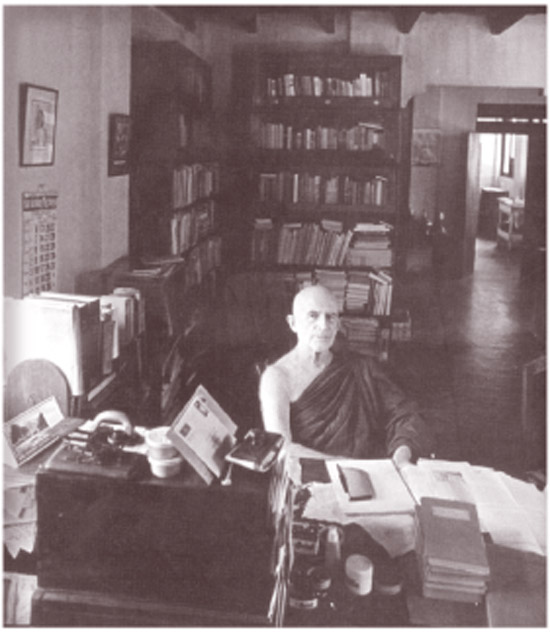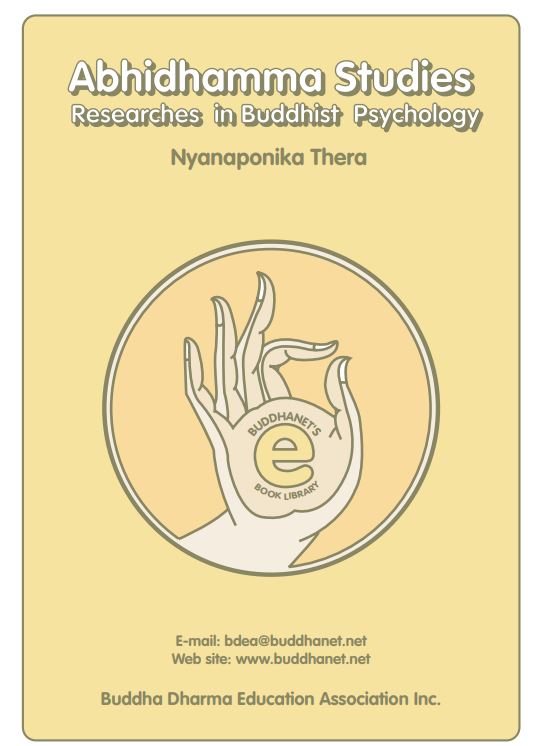Nyanaponika Thera or Nyanaponika Mahathera (July 21, 1901 – 19 October 1994) was a German-born Sri-Lanka-ordained Theravada monk, co-founder of the Buddhist Publication Society, contemporary author of numerous seminal Theravada books, and teacher of contemporary Western Buddhist leaders such as Bhikkhu Bodhi.



Preface
The first edition of this book appeared in 1949 as the second volume of the “Island Hermitage Publications” (Frewin & Co., Colombo). This series has since been discontinued. While the book was out of print for several years, a condensation of some of its chapters, by M. O’C. Walshe, appeared in four issues of the quarterly “The Middle Way” (1959, 1960).
The Second (revised and enlarged) Edition, and the present Third Edition, have been issued by the Buddhist Publication Society, Kandy. To the Second Edition, a new chapter, the first, had been added as a general introduction into the subject. In the Third Edition, only minor changes have been made.
The author’s deep gratitude is due to his revered teacher, the late Venerable Nyanatiloka Mahathera (d. 28.5.57.), who had first introduced the author into the world of the Abhidhamma, and who had helped many Western students of Buddhism to gain a clear understanding of this great Teaching.
Forest Hermitage, Kandy, Sri Lanka. March, 1976.
Introduction
These studies originated when the author was engaged in translating into German the Dhamma- sangani (“Compendium of Phenomena”) and its commentary, the Atthasdlinl. These two books are the starting point and the main subject of the following pages which, in part, may serve as a kind of fragmentary sub-commentary to sections of those two works.
The content of these studies is rather varied: they include philosophical and psychological investigations, references to the practical application of the teachings concerned, pointers to neglected or unnoticed aspects of the Abhidhamma, textual research etc. This variety of contents serves to show that wherever we dig deep enough into that inexhaustible mine, the Abhidhamma literature, we shall meet with valuable contributions to the theoretical understanding and practical realization of Buddhist doctrine. So the main purpose of these pages is to stimulate further research in the field of Abhidhamma, much wider and deeper than it was possible in this modest attempt.
There is no reason why the Abhidhamma philosophy of the Southern or Theravada tradition should stagnate today or why its further development should not be resumed. In fact, through many centuries there has been a living growth of Abhidhammic thought, and even in our own days there

are original contributions to it from Burma, for example, by that remarkable monk-philosopher, the Venerable Ledi Sayadaw. There is a vast number of subjects in the canonical and commen- tarial Abhidhamma literature that deserve and require closer investigation, and new presentation in the language of our time. There are many lines of thought, only briefly sketched in Abhidhamma tradition, which merit detailed treatment in connection with parallel tendencies in modern thought. Finally, in some important subjects of Abhidhamma doctrine we must deplore the partial loss of ancient tradition, a fact which is clearly indicated by the appearance of technical terms nowhere explained. Here a careful and conscientious restoration in conformity with the spirit of the Theravada tradition is required unless we would relegate those parts of the Abhidhamma to the status of venerable but fragmentary museum pieces.
Abhidhamma is meant for inquiring and searching spirits who are not satisfied by monotonously and uncritically repeating ready-made terms, even if these are Abhidhamma terms. Abhidhamma is for imaginative minds who are able to fill in, as it were, the columns of the tabulations, for which the canonical Abhidhamma books have furnished the concise headings. The Abhidhamma is not for those timid souls who are not content that a philosophical thought should not actually contradict Buddhist tradition, but demand that it must be

expressly, even literally, supported by canonical or commentarial authority. Such an attitude is contrary to the letter and the spirit of the Buddha- Dhamma. It would mean that the Abhidhamma philosophy must remain within the limits of whatever has been preserved of the traditional exegeti- cal literature and hence will cease to be a living and growing organism. This would certainly be deplorable for many reasons. We are convinced that the Abhidhamma, if suitably presented, could enrich also modern non-Buddhist thought, in philosophy as well as psychology. To state parallels with modern Western thought or the historical precedence of Buddhist versions is not so important in itself. It is more important that the Buddhist way of presenting and solving the respective problems should show modern independent thinkers new vistas and open new avenues of thought, which in turn might revive Buddhist philosophy in the East. We are convinced that from such philosophical exchange there would arise a glorious vindication of those eternal and fundamental truths, at once simple and profound, which the greatest genius of mankind, the Buddha, proclaimed.
Nyanaponika Thera
